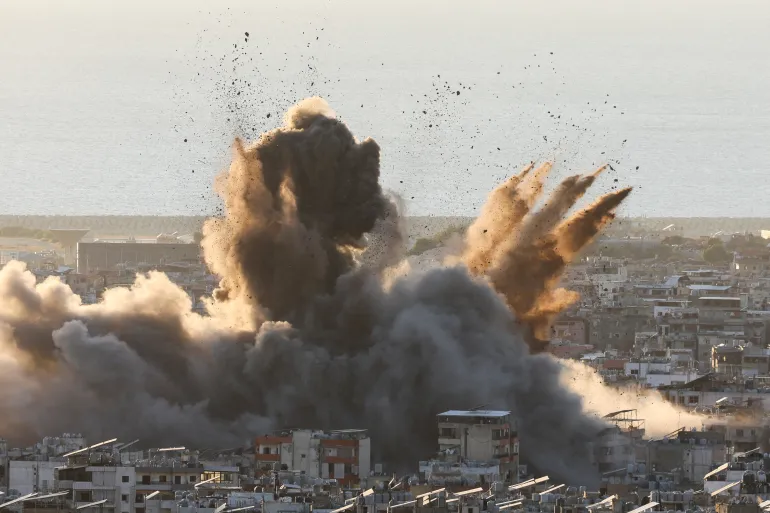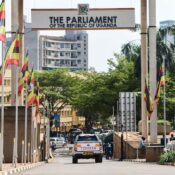
Israel strikes Gaza and Beirut after missiles strike Israel’s north
Following rockets fired by the Lebanese armed organization into northern Israel and a drone launched at Prime Minister Benjamin Netanyahu’s vacation house, Israel on Saturday targeted what it claimed were Hezbollah weapons installations in southern Beirut.
According to his spokesperson, Netanyahu was not present at the time, and it was not immediately apparent whether the building had been struck. However, the prime minister said that his wife was a “severe mistake” and that there had been an attempt to kill him.
The attacks came as Israeli airstrikes killed at least 35 people and tightened the siege surrounding three hospitals in Gaza, where Israel has been fighting the Palestinian militant group Hamas for over a year.
Hopes that the murder of Hamas leader Yahya Sinwar on Wednesday would result in truces in Gaza and Lebanon and stop further escalation in the Middle East have been dashed by promises made by Israel and its adversaries Hamas and Hezbollah to continue fighting.
According to officials, diplomats, and other sources, Israel is attempting to employ more intense military operations to try to protect its borders and make sure its enemies can’t reorganize as the US elections draw near.
Israeli aircraft dropped pamphlets bearing the slogan “Hamas will no longer rule Gaza” and an image of Sinwar over southern Gaza on Saturday.
Israel launched strong attacks on many targets in the southern suburbs of Beirut, causing dense smoke plumes to linger over the city into the evening.
According to Israel’s military, the strikes were directed at “a number of Hezbollah weapons storage facilities and a Hezbollah intelligence headquarters command center.”
According to witnesses, Israel carried out strikes in various parts of the suburbs after issuing evacuation orders for four different communities, advising inhabitants to leave 500 meters (yards) away.
Since Israel started conducting frequent strikes in the southern suburbs around three weeks ago, tens of thousands of residents have left the area, which was once a heavily populated area that also had Hezbollah offices and underground infrastructure.
Hassan Nasrallah, the secretary general of Hezbollah, was murdered by an Israeli airstrike on September 27, and other senior leaders of the Iran-backed organization have also been slain by attacks in the area.
According to U.S. Defense Secretary Lloyd Austin, the United States wants Israel to reduce some of its strikes in and around Beirut.
STRUCK IN A NEW AREA
The first such attack on the region occurred earlier on Saturday when two persons were killed by an Israeli strike while traveling on Lebanon’s main highway close to the town of Jounieh, which has a Christian majority. Israel’s military was investigating the incident, according to a spokesperson.
After a bomb, witnesses reported seeing passengers fleeing from a car, and after another blast, they saw the burnt remains of one passenger.
At least four people were killed in another attack in the Bekaa region of Lebanon, according to health officials. He was the second mayor of a Lebanese town to be killed this week, and one of them was the mayor of a nearby town.
By Saturday night, Hezbollah has reported at least 20 rocket-salvo attacks against Israeli military locations that day. It did not immediately comment on any drone operations or attacks on Netanyahu’s residence in Caesarea, a town in northern Israel.
According to Israeli police, some of the rockets fired from Lebanon were intercepted. However, according to the Israeli paramedic service, at least nine people were hurt and one person was killed during the incident in several locations. People fled to shelters when air raid sirens sounded.
Direct Iranian-Israeli clashes have resulted from the dispute in the last year, including missile assaults on Israel in April and October 1.
In response to the October attack, Netanyahu has promised to act.
TALKS THAT HAVE BEEN STALLED
Since Israel and Hamas started fighting in Gaza last October, Hezbollah and Israel have been exchanging gunfire.
Israel attempted to stabilize the border area for its nationals who had escaped the war by launching a ground invasion into Lebanon over three weeks ago.
On Saturday, Israel’s military claimed to have demolished underground infrastructure and tunnel shafts in southern Lebanon. Additionally, it claimed to have assassinated the deputy commander of Hezbollah in the Bint Jbeil region on Friday.
According to Lebanon’s health ministry, since October 2023, over 2,400 people have died in Lebanon, the majority within the past month. Meanwhile, Israeli authorities report that 59 people have died in northern Israel and the occupied Golan Heights.
Israeli estimates indicate that in the incident that started the war, Hamas-led militants killed some 1,200 people and captured 250 hostages. More than 42,500 individuals have been killed by Israel’s military response, according to Palestinian sources.
Tens of thousands have been maimed, hospitals and schools have been devastated, and the Israeli offensive has left the majority of Gaza’s 2.3 million residents homeless.
In response to international criticism, COGAT, the Israeli military organization in charge of managing operations in the Palestinian Territories, has increased humanitarian supplies into Gaza. Although the amount of supplies reaching Gaza is still far less than what is required, Israel and the United Arab Emirates made an air drop of aid into southern Gaza on Saturday.
According to U.S. President Joe Biden and other Western officials, Sinwar’s passing presented an opportunity to reach an agreement for a ceasefire in Gaza and the release of the remaining hostages.
Weeks have passed with little progress on such a pact. According to Axios writer Barak Ravid on social media platform X, U.S. Secretary of State Antony Blinken, who has spearheaded diplomatic efforts, is scheduled to visit Israel on Tuesday as part of a regional tour.
Biden stated on Friday that while a ceasefire in Lebanon would be possible, it would be more difficult in Gaza.
All Categories
Recent Posts
Tags
+13162306000
zoneyetu@yahoo.com



